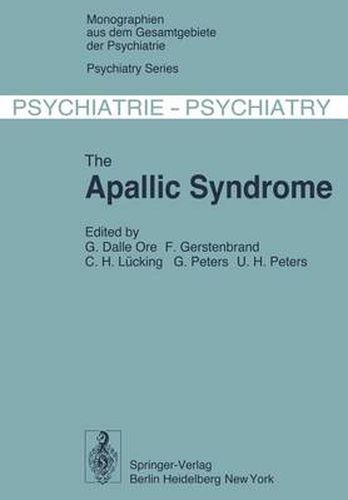Readings Newsletter
Become a Readings Member to make your shopping experience even easier.
Sign in or sign up for free!
You’re not far away from qualifying for FREE standard shipping within Australia
You’ve qualified for FREE standard shipping within Australia
The cart is loading…






This title is printed to order. This book may have been self-published. If so, we cannot guarantee the quality of the content. In the main most books will have gone through the editing process however some may not. We therefore suggest that you be aware of this before ordering this book. If in doubt check either the author or publisher’s details as we are unable to accept any returns unless they are faulty. Please contact us if you have any questions.
The subject of the apallic syndrome is one which has long been familiar to me, although I have not personally studied it as deeply as I would have wished. I became acquainted with this syndrome long before the last war, when my neurosurgical colleague Hugh Cairns (1952), made his pioneer contribution under the term akinetic mutism . This was an ar- resting title, but it was one which did not altogether satisfy some of his colleagues, includ- ing myself. We found it difficult to suggest an alternative. That is one reason why I wel- come the expression apallic syndrome . Forensic practice has forced me from time to time to consider rather more deeply this distressing syndrome, and to try and marshal my ideas in a form which would satisfy my colleagues in the legal profession. More than once I have been instructed to make a medico- legal assessment of these unfortunate patients. The points which have concerned my lawyer friends have not been matters of diagnosis, or of morbid anatomy, or of etiology. The fac- tual problem which has been put before me was to make some approximate assessment as to the expectation of life. Vague guess-work is unacceptable in such circumstances. What the lawyers require is a precise and dogmatic answer.
$9.00 standard shipping within Australia
FREE standard shipping within Australia for orders over $100.00
Express & International shipping calculated at checkout
This title is printed to order. This book may have been self-published. If so, we cannot guarantee the quality of the content. In the main most books will have gone through the editing process however some may not. We therefore suggest that you be aware of this before ordering this book. If in doubt check either the author or publisher’s details as we are unable to accept any returns unless they are faulty. Please contact us if you have any questions.
The subject of the apallic syndrome is one which has long been familiar to me, although I have not personally studied it as deeply as I would have wished. I became acquainted with this syndrome long before the last war, when my neurosurgical colleague Hugh Cairns (1952), made his pioneer contribution under the term akinetic mutism . This was an ar- resting title, but it was one which did not altogether satisfy some of his colleagues, includ- ing myself. We found it difficult to suggest an alternative. That is one reason why I wel- come the expression apallic syndrome . Forensic practice has forced me from time to time to consider rather more deeply this distressing syndrome, and to try and marshal my ideas in a form which would satisfy my colleagues in the legal profession. More than once I have been instructed to make a medico- legal assessment of these unfortunate patients. The points which have concerned my lawyer friends have not been matters of diagnosis, or of morbid anatomy, or of etiology. The fac- tual problem which has been put before me was to make some approximate assessment as to the expectation of life. Vague guess-work is unacceptable in such circumstances. What the lawyers require is a precise and dogmatic answer.